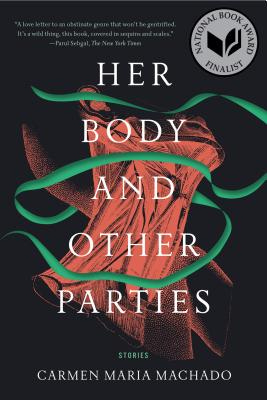Spooky feminist stories, Cloudbusting, and other parties
Last week, I got to wax poetic about Carmen Maria Machado’s Her Body and Other Parties for a class assignment (what?? you still take classes? Is that how you keep your youthful glow?). In lieu of the usual recs, I thought I’d share part of it.
I also read Machado’s memoir In The Dream House and loved it. It’s complicated and sad, but ultimately hopeful.
If you purchase a book through an affiliate link, I may make a small commission, which I will donate.
I have read Carmen Maria Machado’s short story “The Husband Stitch” at least five times, and I have asked about six friends to read it as well. I find something new to admire each time I revisit it. “The Husband Stitch” and the rest of the stories in Machado’s collection Her Body and Other Parties are spooky works about navigating the world as a woman. While I have often seen the book classified as horror, I think the stories in the collection jump between genres. Some feel like a campfire ghost story, while others feel like an episode of The Twilight Zone. At any rate, her stories stay with me long after I read them. Machado’s ability to cloak personal observations in horror or fairytale have had great influence on me as a writer and as a reader.
Machado takes folk tales and urban legends, and she retells them, centering them on the experience of a female character. By virtue of being a woman, the narrator is someone who cannot make all her own choices. In this way, Machado uses horror and fantasy to shine a light on the horror that this subjugation causes. In “The Husband Stitch,” she opens the story with stage directions that let the reader sense this from the get-go:
“If you read this story out loud, please use the following voices:
Me: as a child, high-pitched, forgettable; as a woman, the same...
...All other women: interchangeable with my own.”
By using stories that most people have a passing familiarity with — the woman with the ribbon around her neck, the girl who dared to sneak into a graveyard — Machado prods at power dynamics that many people accept without questioning, dynamics so old that it may not even occur to people that they can be questioned.
Another story in the collection is “Especially Heinous: 272 Views of Law & Order: SVU.” Subheadings are named like Law & Order episodes, and paragraphs read like brief synopses of episode plots. The way the story is structured, with a bold title and short description, makes the flow feel poetic. Like any SVU episode, people are killed and assaulted violently. In some places, Machado seems to wink at the reader, to acknowledge how desensitized we have become to this violence, largely against women:
“They are raped and murdered. To add insult to injury, they are confused with two other raped and murdered underage models,”
or
“The second time the basketball team covered up a murder, the coach decided that he’d finally had enough.”
This story could have easily fallen into the familiar conversation surrounding the true crime genre: why is murder and sexual violence something to consume and be entertained by? Why are women, who are disproportionately the victims in these accounts, the main demographic for the true crime genre, the ones doing the consuming?
But as Machado’s episodes go on, they get stranger, and the victims from previous episodes refuse to be dismissed. They refuse to be one in a “monster-of-the-week”/case-solved type story.
The narrative gets complicated, and I find it hard to follow at times. In spite of this, I love it. I love that Machado plays with a form that her reader is familiar with and turns it into this epic urban legend. She takes violence that the audience has become accustomed to hearing about and makes it new and unusual again. She restores some agency to the victims, some power to the dead.
While Machado’s stories all have organic-feeling endings, she does not tie everything up in a satisfying bow or shout, “HERE IS THE MORAL OF THE STORY.” Her conclusions are more subtle. She presents a story you have heard 1,000 times before and shines a light on a dimension of it you might have missed. She does not offer all the solutions, but she forces us to look at the problems.
What I’ve been listening to:
Let It Be - The Replacements
Hounds of Love - Kate Bush (“Cloudbusting” is the song of the summer every summer)
Almost - The Ophelias
The “You’re Wrong About” podcast - “Every week [the hosts] reconsider a person or event that's been miscast in the public imagination.”




